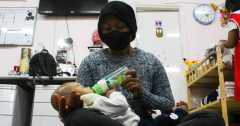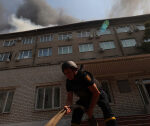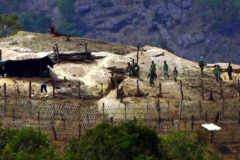This story was produced in partnership with the Pulitzer Center.
Taichung City, Taiwan – Bernard keeps a low profile.
Heading to work on the streets of Taiwan, the 45-year-old Filipino migrant worker dodges glances and often checks his face mask to make sure his appearance is concealed.
To hide his accent, he often speaks in a near-whisper.
Often, he declines invitations to social occasions from his fellow countrymen, worried that a “Judas” among them might report him to the authorities.
Hired at one of Taiwan’s many electronics factories, Bernard came to the island legally in 2016.
But since June 2024, he has been among Taiwan’s growing population of undocumented workers. He blames his broker, a private employment agent to which migrants are usually assigned, for his current predicament.
Bernard’s broker tried to confiscate his passport, he said, then tried to convince him to resign and forgo severance payments from his employer.
He refused both times, he said, causing a rift between them.
“They [brokers] only speak to you when they come to collect payments or when they want to trick you,” Bernard, who asked to use a pseudonym out of fear of repercussions, told Al Jazeera.
Brokers in Taiwan take a cut of their clients’ wages and have significant influence over their conditions and job prospects, making their relationships prone to abuse.
When Bernard’s contract expired in 2022, he said, his broker blacklisted him among other employers.
Desperate to support his daughter’s education in the Philippines, Bernard ditched his broker and decided to overstay his visa to work odd construction jobs, he said.
These days, he said, he feels “like a bird in a cage”.
In public, Bernard would not even utter the word “undocumented” in any language, only gesturing with his hands that he ran away.
![Joy Tajonera celebrates Sunday Mass at Taichung Catholic Church in Taichung, Taiwan, on May 23, 2025 [ Michael Beltran/Al Jazeera]](http://www.aljazeera.com/wp-content/uploads/2025/07/Father-Joy-Tajonera-holding-sunday-mass-1751871878.jpg?w=770&resize=770%2C513&quality=80)
Taiwan’s undocumented workforce is rising fast.
The number of unaccounted-for migrants on the island has doubled in the last four years, reaching 90,000 this January, according to the Ministry of Labor.
Despite Taiwan’s image as one of the region’s rare liberal democracies, a growing number of Southeast Asian migrant workers are living under the constant threat of deportation and without access to social services.
Taiwan institutionalised its broker system in 1992 in a bid to streamline labour recruitment.
Brokers influence almost every aspect of a migrant worker’s life, from where they live, to their meals, to the terms of their employment contracts, and even how they access public services.
Migrant rights advocates say it is precisely this level of control that is prompting large numbers of workers to flee their workplaces.
Over a third of all complaints made by migrants to the Ministry of Labor are broker-related, according to official data.
As of January 2025, Vietnamese made up the biggest share of the undocumented at 57,611, followed by Indonesians at 28,363, and Filipinos at 2,750.
Joy Tajonera, a Catholic priest who runs the Ugnayan Center, a migrant shelter in Taichung City, said the Taiwanese government has taken a lax approach to the issue.
“The system allows the brokers a power to be used to the disadvantage of migrants,” Tajonera told Al Jazeera.
“Meanwhile, employers play innocent.”
Brokers typically charge migrants a monthly service fee of $50 to $60, and also collect fees for job transfers, hospital insurance, leave, and most of the necessary documentation to work in Taiwan.
In some cases, they impose age limits for certain jobs.
Tajonera said many undocumented workers can actually earn more without a broker, “but then you lose all social protections and health insurance. It’s not that they want to run away. It’s their situation, they can’t take it any more.”
‘Shameless and stupid’
Taiwan’s Labor Ministry said in a statement that the increase in undocumented migrants was driven by pandemic-related disruption to deportations.
It said it has taken various steps to improve conditions for migrant works, including raising the minimum wage, conducting regular inspections of recruitment agencies, introducing a new suspensio





